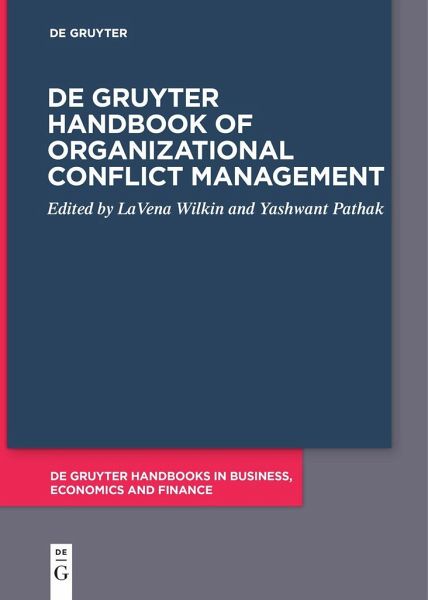
De Gruyter Handbook of Organizational Conflict Management
Versandkostenfrei!
Versandfertig in 6-10 Tagen
44,95 €
inkl. MwSt.

PAYBACK Punkte
0 °P sammeln!
The De Gruyter Handbook of Organizational Conflict Management offers insightful contributions covering a myriad of conflict management topics ranging from fundamental issues, such as emotional intelligence and cultural differences, to cutting-edge themes such as political conflicts and mindfulness training. Renowned conflict management scholars and leading practitioners have contributed chapters to this handbook based on their research and their practical experience in the field of confl ict management. Many of the authors have influenced the topic of conflict management as it has become both ...
The De Gruyter Handbook of Organizational Conflict Management offers insightful contributions covering a myriad of conflict management topics ranging from fundamental issues, such as emotional intelligence and cultural differences, to cutting-edge themes such as political conflicts and mindfulness training. Renowned conflict management scholars and leading practitioners have contributed chapters to this handbook based on their research and their practical experience in the field of confl ict management. Many of the authors have influenced the topic of conflict management as it has become both a fi eld of academic study in universities and a necessary leadership skill.
The handbook is organized in four sections. The first section covers interpersonal conflict management and focuses on perceptions, conflict styles, emotional intelligence, psychological safety, and change. The second section includes ethnic and cultural issues in organizational conflict management, such as microaggressions, ethnicity and religion, and political conflicts. The third section offers methods for managing organizational conflicts, including mediation, negotiation, ombudspersons, and conflict coaching. This section also offers guidance on developing an organizational conflict management system and discusses HR's role in managing conflicts. The fourth section introduces chapters on special topics in conflict management, such as workplace bullying, gender issues, birth order personality, human connections, and forgiveness.
This handbook is an essential reference for scholars and practitioners. It offers organizational leaders insights into the causes and solutions to organizational conflict management. In addition, it is an excellent textbook for undergraduate and graduate courses in organizational conflict management.
The handbook is organized in four sections. The first section covers interpersonal conflict management and focuses on perceptions, conflict styles, emotional intelligence, psychological safety, and change. The second section includes ethnic and cultural issues in organizational conflict management, such as microaggressions, ethnicity and religion, and political conflicts. The third section offers methods for managing organizational conflicts, including mediation, negotiation, ombudspersons, and conflict coaching. This section also offers guidance on developing an organizational conflict management system and discusses HR's role in managing conflicts. The fourth section introduces chapters on special topics in conflict management, such as workplace bullying, gender issues, birth order personality, human connections, and forgiveness.
This handbook is an essential reference for scholars and practitioners. It offers organizational leaders insights into the causes and solutions to organizational conflict management. In addition, it is an excellent textbook for undergraduate and graduate courses in organizational conflict management.












